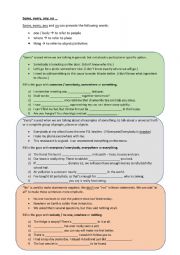
|
every- some- no- any- words overview and exercises
An overview of how the prefixes EVERY, SOME, NO and ANY combine with ONE/BODY, THING and WHERE.
Each prefix is discussed separately, with a guided gap-fill exercise each time.
The final exercise asks students to do a mixed gap-fill as a plenary/conclusion activity.
Level: intermediate
Age: 10-100
Type:
Downloads: 41
|
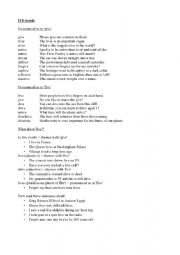
|
IVE pronunciation in English
A handout showing the two main ways of pronouncing the letter combination IVE in English - as in �give� or as in �five.�
Special consideration is given to the problem of live/live/alive/lives.
Level: intermediate
Age: 8-100
Type:
Downloads: 12
|
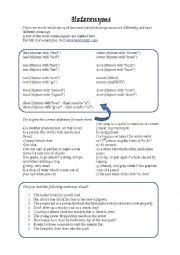
|
Heteronyms
9 common pairs of heteronyms and exercises to work with them.
Heteronyms are words which look the same but are pronounced differently and have different meanings. For example "lead" (a metal) and "lead" (a verb meaning "to guide").
Level: intermediate
Age: 12-100
Type: worksheet
Downloads: 22
|
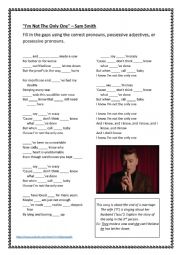
|
Pronouns and possessive adjectives in the song "I�m not the only one"
"I�m not the only one" by Sam Smith - lyrics with most of the pronouns and possessive adjectives removed. This song has a really good range of pronouns in it.
The pupils should listen to the song (link provided) and fill in the gaps, and then re-tell the story by transforming the text into the 3rd person using �he� and �she� pronouns.
Level: intermediate
Age: 10-100
Type:
Downloads: 19
|
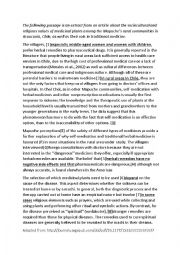
|
ACT or SAT practice: delete/add text elements (topic: traditional medicine)
An exercise about text comprehension at a deeper level. Readers must decide how deleting a portion of the text would affect the meaning. Other questions ask whether certain elements should be added to the text, and if so, where would be best.
Level: advanced
Age: 14-100
Type: worksheet
Downloads: 18
|
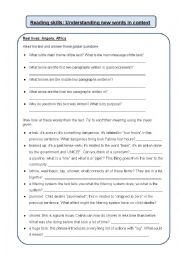
|
Reading skills: eliciting the meaning of unknown words
Questions to accompany text about water and sanitation in Angola, Africa.
The goal of the exercise is to build students� confidence when faced with unknown or complicated words.
The activities on the sheet guide pupils through a structured reading of the text and encourage them to consider the possible meanings of new words. They are then asked t...
Level: advanced
Age: 13-100
Type: reading
Downloads: 38
|
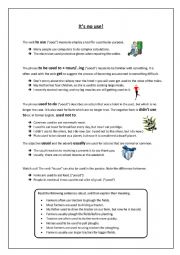
|
Easily confused words: use - used to do - be used to doing - usually
A clear explanation of the commonly confused phrases use, used to, be used to and usually.
Worksheet covers pronunciation, open-ended expression and sentence correction (choose the correct option).
Answers are on the final page.
Level: advanced
Age: 10-100
Type:
Downloads: 28
|
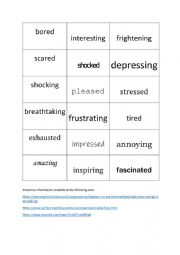
|
Participles used as adjectives: cards
A set of adjectives ending in -ed or -ing for students to use to create random sentences. Good plenary or warm-up activity.
Level: intermediate
Age: 8-100
Type:
Downloads: 10
|
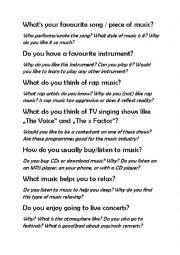
|
Music and music preferences pairwork discussion activity
Questions about music and music preferences; useful phrases to include in answers. Pupils work in pairs or small groups. Suggested activity: they interview each other using the questions provided. Each time a pupil answers a question, they must draw one of the phrase cards (p2) from a hat or envelope and include that phrase in their answer. Increas...
Level: intermediate
Age: 15-100
Type: activity-card
Downloads: 27
|
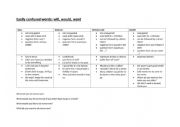
|
Easily confused words: will, would, want, would like
An overview of 4 easily confused and misused verb structures: will, would, would like, want.
There are simple exercises to practise the question and negative form of these structures, and then reading comprehensions and questions which use the structures in context.
Answers are provided on p4 of the document.
Level: intermediate
Age: 8-100
Type: worksheet
Downloads: 15
|